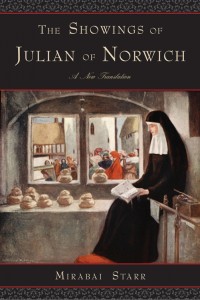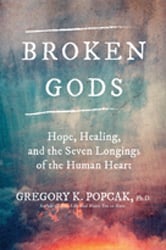 Mirabai Starr, teacher of philosophy and world religions at the University of New Mexico – Taos, has taken on the challenge of translating the writings of a thirteenth century Christian mystic from England and bringing them to a modern audience. Apparently, Starr is “at the vanguard of the emerging Interspiritual movement,” a movement that I can’t seem to find a lot of direct information about, but seems to be a rather New Age blur of the three major monotheistic traditions, focusing on a God of Love. This is not exactly my cup of tea, for a variety of reasons, but it’s hard to criticize people actively working for interspiritual dialog and professing Love.
Mirabai Starr, teacher of philosophy and world religions at the University of New Mexico – Taos, has taken on the challenge of translating the writings of a thirteenth century Christian mystic from England and bringing them to a modern audience. Apparently, Starr is “at the vanguard of the emerging Interspiritual movement,” a movement that I can’t seem to find a lot of direct information about, but seems to be a rather New Age blur of the three major monotheistic traditions, focusing on a God of Love. This is not exactly my cup of tea, for a variety of reasons, but it’s hard to criticize people actively working for interspiritual dialog and professing Love.
Some people may know the writings of Julian of Norwich by another name, The Revelations of Divine Love. This is how I’d read the work before. Having been deeply challenged and moved by this work in the past (this is either my third or fourth reading), I was looking forward to revisiting this text with new eyes, eyes both more deeply knowledgeable of the greater Christian tradition and now with a Pagan sensibility.
I approached this text with two questions in mind. The first question was: Does Starr accomplish her goal of bringing this work to a new audience? Here the answer is unequivocally, yes. I will admit that this is not my favorite translation of this work. In order to make this text, originally written in Middle English, relevant to a non-academic, non-theologically trained audience, I find the language quite watered down. I do not think Starr strays from Julian’s intent; I just find lacking a certain religious specificity and the beauty of slightly more formal language. I also noticed, when comparing translations, that occasionally some more problematic references (such as Jews being betrayers of Jesus, a perfectly normal reference in Julian’s time) are missing.
While I might quibble over the theological specifics here and there, both with Starr’s choices and what Julian has to say, I think this book is now made more accessible to the general Christian than the translation I prefer. Julian’s place in the wide river of the Christian tradition deserves to be understood. She is a mystic of exquisite optimism. In fact, I will be giving my copy of this book to my Christian mother-in-law. Christians who may never have picked up a book on medieval mystics may actually find that they get a lot out of this translation.
This brings me to my second question: Why should Pagans read this book? Honestly? There’s no need for Pagans to read this book. It’s not directly relevant and can seem quite long and repetitive, particularly if you don’t understand Julian’s context, both in time and Christian development. That said, this book may appeal to Pagans who are active in interfaith work or who have a strong mystical bent of their own. While firmly ensconced in traditional Christianity, Julian does express some remarkable views on sin and the Motherhood of Jesus; everything is love, All is Love and all shall be well. This book is essentially Unverified Personal Gnosis. The Catholic Church has never canonized Julian, but neither has she been censored. Her words are not doctrine, but they are available for the edification of those who would take her words to heart.
Julian’s revelations are spread out over 200 (nicely spaced) pages, yet the Motherhood of Jesus doesn’t make an appearance until the last quarter of the book. Yet, this is often what is most remarked upon when her writings are mentioned. The notion of Jesus as Mother was a profoundly radical idea in Julian’s time. I remember the first time I read this piece. I was shocked and amazed by this concept. The second time I read this I was wonderfully pleased. But now….. Now I find the concept theologically troubling. Once again, actual female-ness is usurped by a male. Jesus’s incarnated maleness and his divinity absorb all that was raised high and noble for females.
My recommendation for this book is that many Pagans won’t miss anything if they skip it. But if you want to explore a radical Christian text or dive into the mystic tradition, this would be a great translation to start with. If you’ve got a Christian in your life that needs some divine optimism or perhaps their understanding of the Christian tradition needs to be expanded, this would also be an excellent gift to give.















